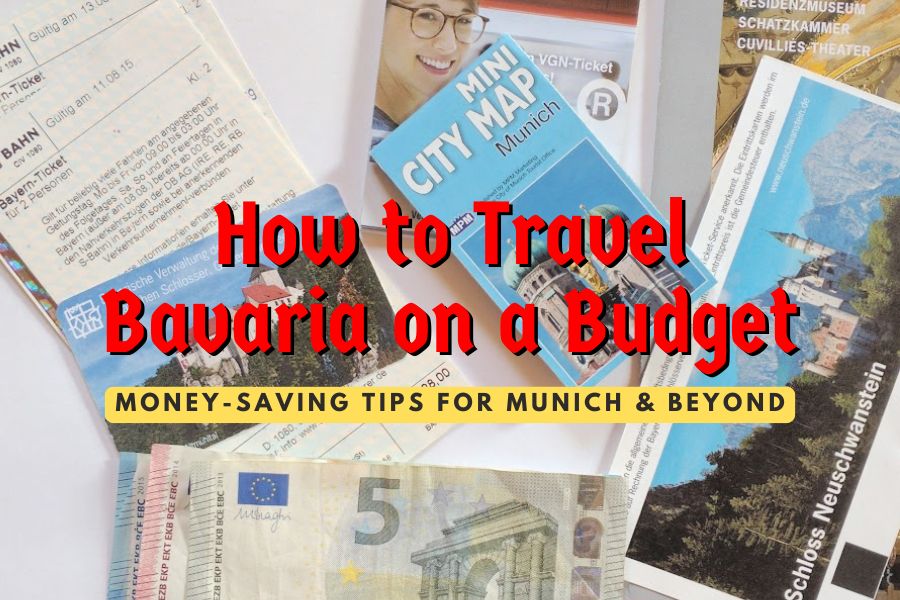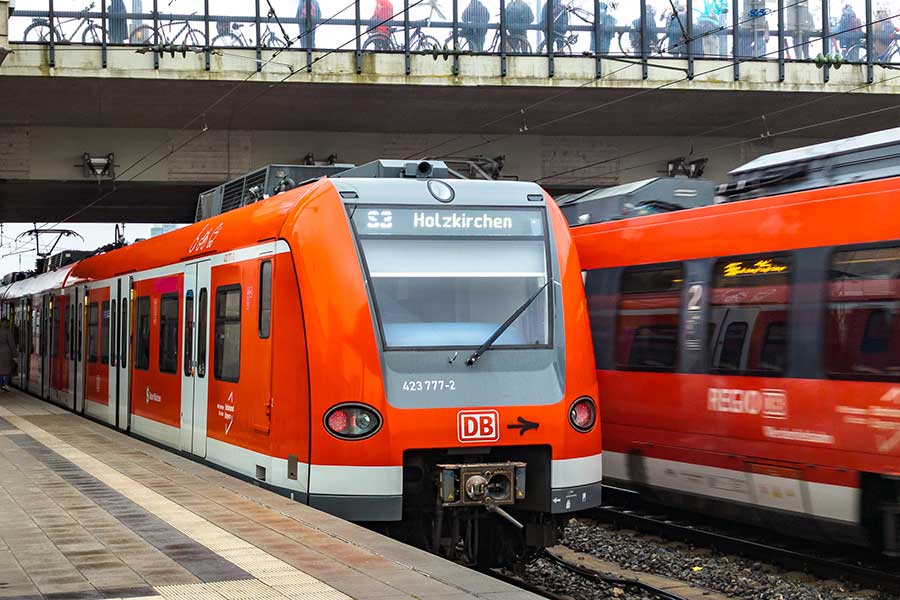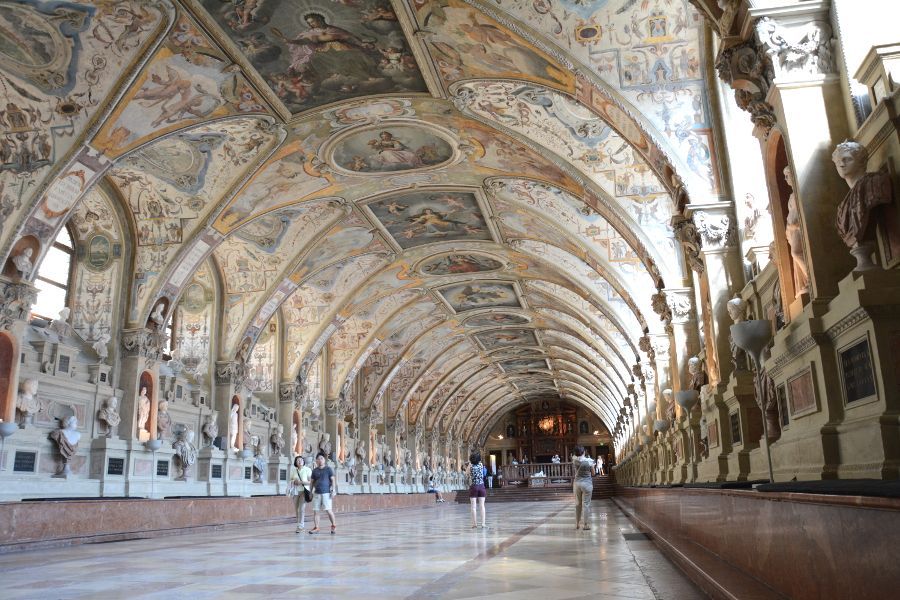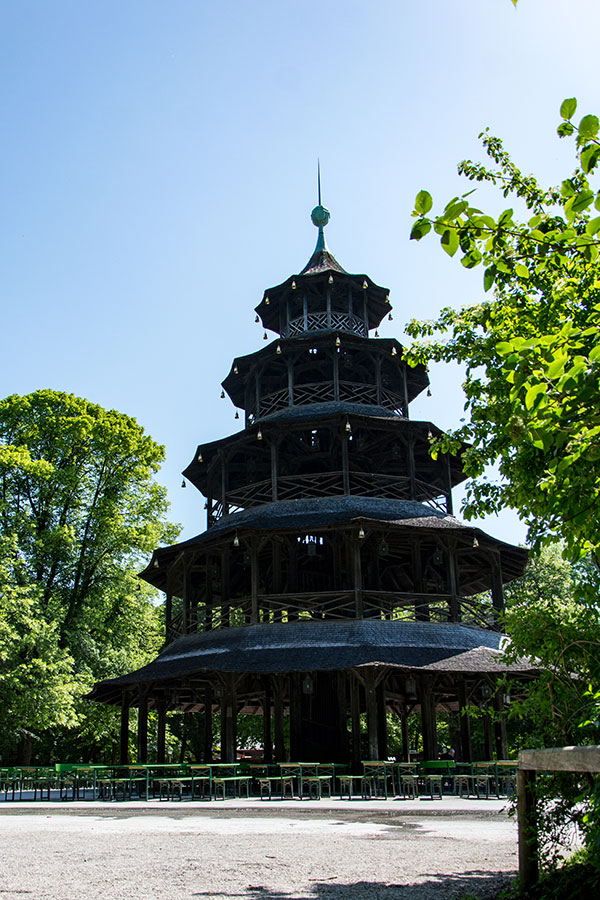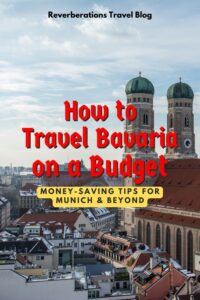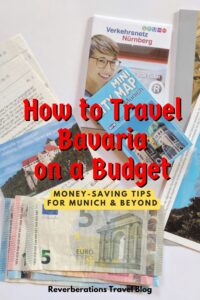Whether you’re visiting Bavaria for Oktoberfest, exploring Neuschwanstein Castle, or enjoying Munich and small Alpine towns, get ready to reach for your wallet. Southern Germany is the most expensive region in the country, with Munich as its priciest city.
Over the years, I’ve learned smart ways to save money in Bavaria without sacrificing the experience. It’s not about being cheap—it’s about being strategic.
Cash is King, But…
As many travelers know, currency exchange fees can add up quickly. If you convert money at a bank before your trip or use a currency exchange abroad, you’ll likely pay extra fees, whether as a flat rate or a percentage of the exchanged amount.
Germany is still largely a cash-based society, though credit card acceptance has improved in recent years. Most large restaurants and attractions now accept cards. However, when paying by credit card at restaurants, you’ll usually need to ask to add the tip to the bill.
Using an ATM in your destination is usually the cheapest way to get cash. I say “usually” because each bank and ATM can tack on their own fees. For example, your bank may add fees and the bank ATM may also add fees. Be sure to do your research with your home bank and the ATM before a transaction to avoid any surprises. Always try to use an ATM from a bank you’re familiar with and trust.
ATM withdrawals are usually the cheapest way to get cash, but be aware that both your home bank and the local ATM may charge fees. Always check with your bank before traveling and look for ATMs operated by trusted banks to avoid unnecessary charges.
Use a credit card with no foreign transaction fees to save on exchange costs. I personally recommend the Capital One VentureOne card, which eliminates these fees. For large expenses like hotels, this can add up to significant savings.
Because ATM fees can be higher than credit card fees, consider using digital tickets for transit and attractions whenever possible to minimize cash withdrawals.
Save Money on Trains & Public Transit
Public transportation in Germany is affordable, efficient, and reliable. There are no turnstiles—you simply buy a ticket, validate it (if required), and ride.
For extended trips within Germany, money-saving train passes can be a great option:
- Deutschland-Ticket (58 Euros/month) – Unlimited travel on local transport (subways, trams, buses, and regional trains) across Germany, including Munich’s public transit system.
- Bayern-Ticket – Ideal for day trips across Bavaria, including to Neuschwanstein, Nuremberg, or even Salzburg. Valid on regional trains.
- Schönes Wochenende Ticket – Discounted weekend travel within Germany.
These passes use slower regional trains, so be sure to compare travel times and prices if speed is a priority.
Save on Castles & Attractions with the Bavarian Palace Pass
If you’re planning to explore Bavaria’s famous castles, the Bavarian Palace Administration‘s Bavarian Palace Pass is a must-have. This pass grants admission to over 40 palaces, gardens, and historic sites, including Neuschwanstein Castle, Imperial Castle in Nuremberg, Herrenchiemsee Palace, and Munich’s Residenz.
You can buy it as a 14-day pass or an annual pass for individuals or families.
If you’re only interested in King Ludwig II’s castles (Linderhof, Herrenchiemsee, and Neuschwanstein), the Königsschlösser Pass might be a better deal.
The pass can be purchased online, at participating palaces, or at Infopoint Museen & Schlösser in Bayern in Munich.
Cheap Eats: Where to Find Budget-Friendly Food
Munich and Bavaria are full of delicious things to eat, both sweet and savory. But you can eat well while saving money.
At restaurants, always check the daily specials. The specials are seasonal, fresh, and sometimes at a reduced price.
Some restaurants with a Biergarten will offer both table service and self-service. Self-service tends to be slightly cheaper. This is also true with many cafes that have to-go offerings like baked goods.
Often you can even find what you’re looking for at the grocery store. Fairs and festivals will offer chocolate-covered strawberries on a stick but, seasonally, I’ve seen local grocery stores like Rewe offering the sweets for a cheaper price.
Free & Cheap Things to Do in Munich & Bavaria
You can’t get cheaper than free. Some of the best experiences in Munich are free!
- Palace gardens & parks – While places like Nymphenburg Palace require an admission fee, you can explore the gardens and grounds for free.
- Churches & historic sites – Admire the Frauenkirche, Odeonsplatz, and Marienplatz without spending a dime.
- Museum discounts – Look for free or reduced admission.
- BMW Welt is free year-round.
- Lenbachhaus is free on the first Thursday of the month (6–10 PM).
- Sunday museum specials – Several museums, including the Bavarian National Museum and Glyptothek, offer 1 Euro admission on Sundays.
Check out my full list of free things to do in Munich for more ideas.
Saving Money with Sightseeing Passes: Is the Munich City Pass worth it?
It depends. The city offers two sightseeing passes:
- Munich Card – Cheaper, offers discounted admission to attractions.
- Munich City Pass – More expensive, provides free entry to major attractions and a Hop-On Hop-Off bus tour.
Both passes are available for 1-5 days and can include public transport. If you plan to visit multiple attractions quickly, the pass can be a good deal.
For example, a combo ticket for the Residenzmuseum, Schatzkammer, and Cuvilliés-Theater costs 20 Euros. Adding a Hop-On Hop-Off Express Circle tour (26 Euros) brings the total to 46 Euros, whereas the Munich City Pass starts at 39.90 Euros.
It’s important to do the math before purchasing.
Finding Cheap Accommodations in Munich and across Bavaria
Staying in Munich doesn’t have to be expensive. Here’s how to save:
- Stay outside the city center – Neighborhoods outside of the city center are well-connected by transit and offer better deals. It also allows you to experience the city like a local.
- Budget hotels with free breakfast – My go-to is Holiday Inn Express Munich City West, which is affordable, comfortable, and includes free breakfast. It’s a 10-minute S-Bahn ride to Marienplatz.
- Consider the season – Certain times of the year are just more expensive than others. During Oktoberfest and the Christmas season, prices for hotels are significantly higher. Look for alternatives. Want to attend a beer festival but not pay the higher hotel rates? Consider Starkbierfest around March or the spring festival around April.
- Join hotel loyalty programs – If you’re not already a member, now is the time! Spend points you have or earn points for a future trip.
Traveling to Munich and Bavaria on a budget is absolutely possible. With smart spending on transport, food, and sightseeing passes, you can enjoy Bavaria’s best experiences without breaking the bank.
Got more money-saving tips for Bavaria? Share them in the comments!
Save this post for later on Pinterest!
All photos and opinions are my own. This post contains affiliate links.
